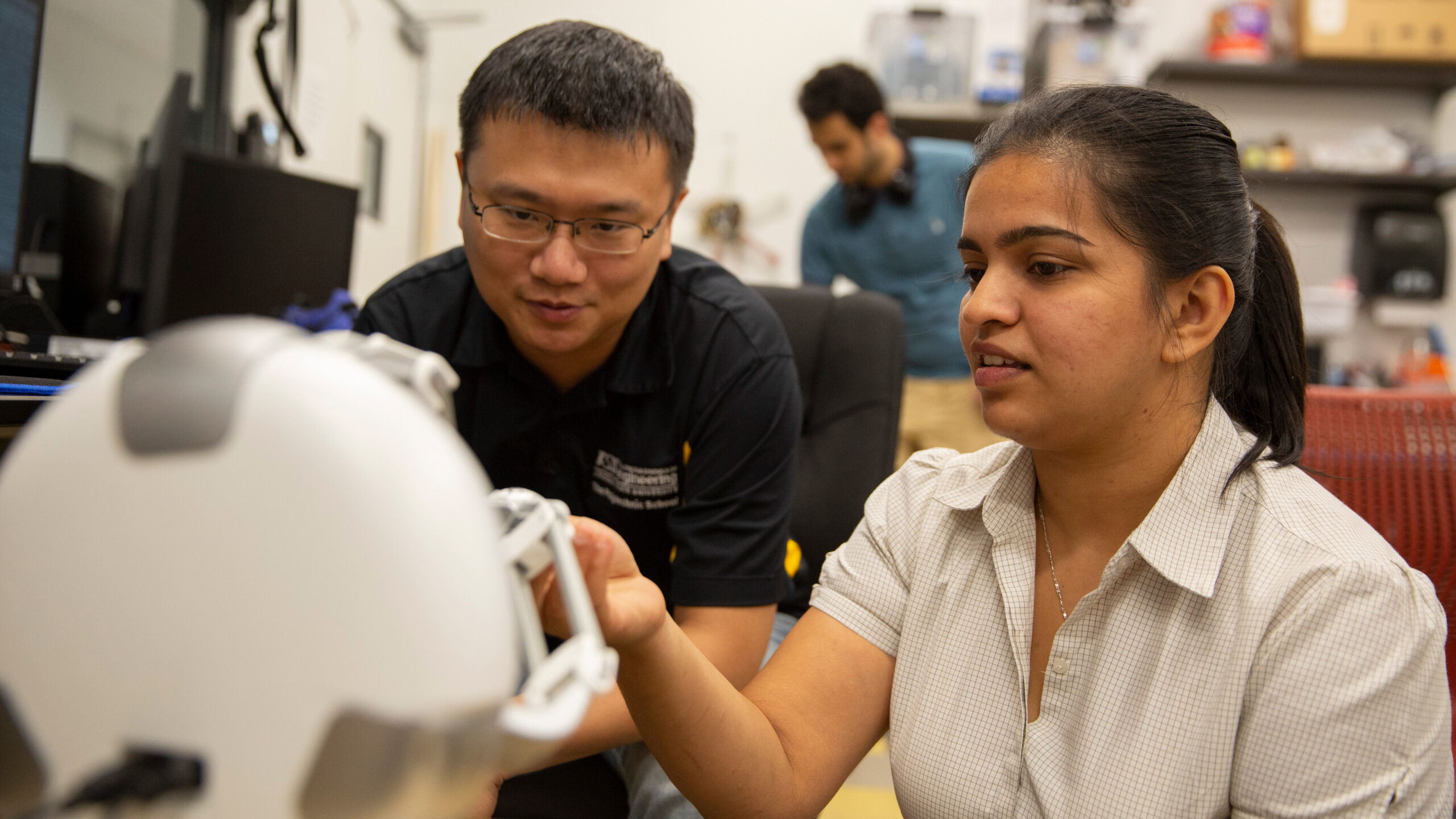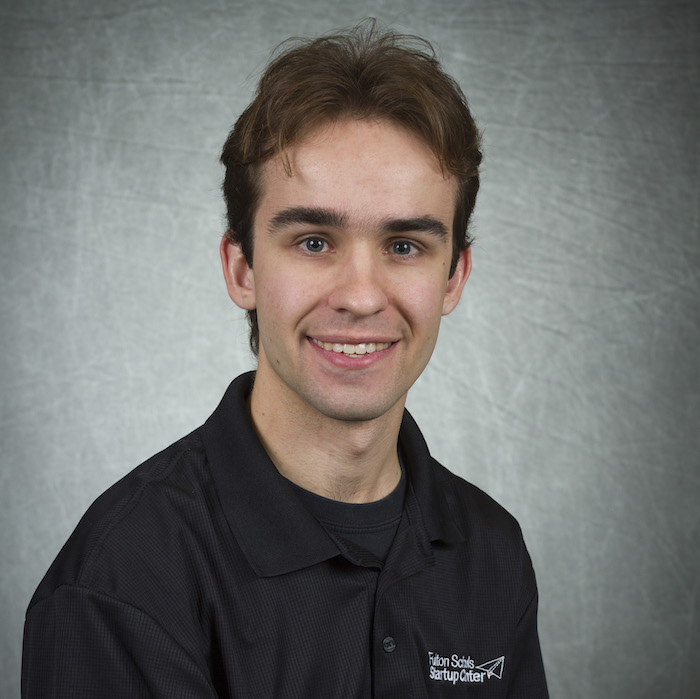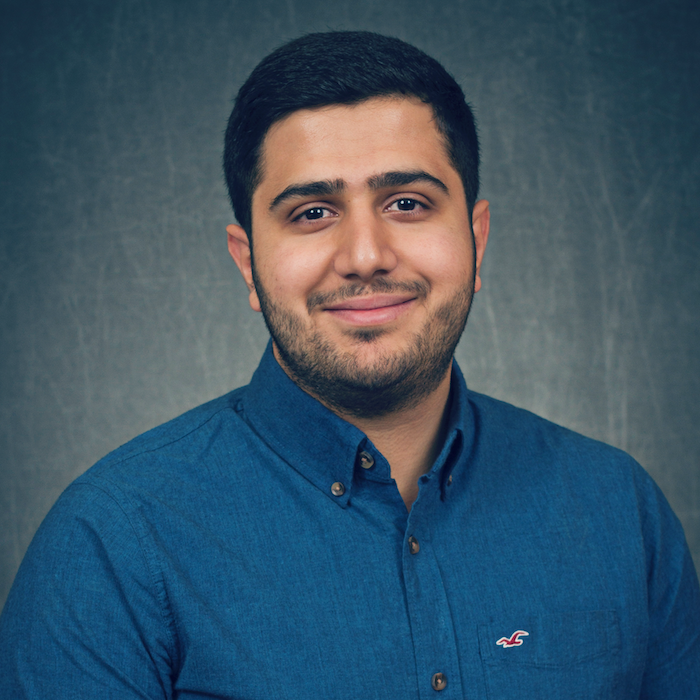
MORE program funds research for master’s students

Above: Pallavi Shintre, a master's student in electrical engineering, works with her faculty mentor Wenlong Zhang on a research project analyzing human-robot interactions as part of the Master's Opportunity for Research in Engineering program. Photographer: Connor McKee/ASU
The Master’s Opportunity for Research in Engineering, also called the MORE program, offers support for master’s students in the Ira A. Fulton Schools of Engineering to conduct research under the guidance of a faculty mentor.
“The MORE program came about three years ago when we realized that the majority of our graduate students are master’s students rather than doctoral students, and the majority of those master’s students are here mostly to do courses rather than applied projects,” says Pat Phelan, the program faculty director. “A lot of students, regardless of whether they do a thesis or not, want to do some kind of research, and we wanted to give them that opportunity.”
Through the program, master’s students who are not already supported by research funding as paid research assistants have the opportunity to work one-on-one with a faculty member on a research project over the course of a semester. Students are able to apply for up to two semesters at a time under the same faculty mentor.
“What’s special is it gives all our master’s students a chance to write a short proposal together with a faculty member and actually get funding as well as access to travel funds to present their work at a conference,” says Phelan, who is also a professor of mechanical and aerospace engineering in the School for Engineering of Matter, Transport and Energy, one of the six Fulton Schools, and the assistant dean of graduate programs for the Fulton Schools. “It’s also really important from a faculty point of view because we’re always looking for talented students who are eager to do research.”
At the end of each semester, alongside undergraduate students in the Fulton Undergraduate Research Initiative, MORE students share their findings at the FURI symposium.
Participating MORE students earn a stipend of $1,500 upon completion of the program and are eligible for up to $400 in funding for research supplies to support their projects.
Engineering better computer-aided design tools

Cole Brauer
Daniel Aukes, assistant professor in engineering at The Polytechnic School, mentored Cole Brauer, a master’s student in engineering, through the MORE program.
During Fall 2018 and Spring 2019, Brauer conducted research with Aukes to investigate ways to automate the planning of multi-material manufacturing processes.
“Cole worked — and continues to work — on developing multi-material design and manufacturing tools that permit one to specify and compute with multi-materials geometries and subsequently simulate and manufacture multi-material designs using rapid prototyping tools like 3D printers,” Aukes says. “This work is important because today’s computer-aided design tools don’t have that capability, which makes them ill-suited at meeting the needs of the kinds of manufacturing advances we’ve seen in the last decade.”
Brauer returned to the MORE program in Spring 2020 to expand his research on multi-material design and manufacturing tools, and has since graduated.
Aukes was thankful for the opportunity to explore new avenues of research by mentoring Brauer.
“I get the chance to expand on my own interests and to see the results play out in interesting ways, perhaps seeing progress on a topic I myself am unable to work on but feel passionate about,” Aukes says. “MORE research helps me make connections between different threads in my lab and current trends in science and engineering. And the results from MORE research can serve as important stepping stones to gain funding by showing tangible and promising initial results in a new area.”
Research antimicrobial surfaces for use in space

Kiarash Ranjbari
Kiarash Ranjbari, a master’s student in civil, environmental and sustainable engineering, conducted research in the MORE program during Spring 2020 under the mentorship of Francois Perreault, an assistant professor in the School of Sustainable Engineering and the Built Environment.
“My research project proposes to develop antimicrobial surface coatings using silver nanoparticles to prevent biofilm formation on metallic surfaces at the International Space Station,” Ranjbari says. “This is expected to reduce the costs for water quality control and reduce potential health risks or system damage caused by biofouling.”
Ranjbari is continuing his research in the program this semester as well, and looks forward to expanding his project to improve the long-term performance of silver coatings.
“The MORE program gave me the opportunity to work one-on-one with faculty, make connections with other graduate students and contribute to the creation of a new water treatment method,” Ranjbari says. “It helped me explore my primary research interests, clarify my career goals and significantly improve my academic writing skills.”
So far, Perreault has mentored three students in the MORE program and says he values the opportunity to engage with them on impactful research.
“I was part of the first cohort of MORE faculty mentors,” says Perreault. “It’s great to have a program that supports master’s students at ASU. The program also allows us to explore research areas where there is otherwise not a lot of funding or people working on them. It’s great to be able to leverage the work we’re doing here to secure funding for the future.”
MORE motivation to pursue a doctoral degree
Husain Mithaiwala, a chemical engineering graduate, conducted research as part of the MORE program in both Spring and Summer 2020 under the mentorship of Matthew Green. Mithaiwala pursued a research project on reverse osmosis water treatment technologies.
“Through this project, I have learned skills of polymer synthesis, polymer processing and polymer characterization,” Mithaiwala says. “Now, whenever I encounter a research problem or research statement related to my project, I am able to identify the correct approach to those based on the acquired set of skills. Currently, I am involved in a project where we are electrospinning polymeric membranes that will be used as sorbents for direct air capture of CO2.”
Mithaiwala graduated in Spring 2020 and is planning on pursuing a doctoral degree at ASU, motivated in part by his experience in the MORE program.
“The MORE program has been a culminating experience for me in my graduate studies,” Mithaiwala says. “I have always had an inclination towards research but there were limited opportunities during my bachelor’s studies. Here, I was able to perform an independent research project with unhindered support from my mentor, advisor and staff. I am thankful to my advisor Dr. Matthew Green, who has been an amazing mentor and has always motivated, supported and trusted me with research findings during this project.”
“I enjoyed the overall experience of independent research and was further motivated to pursue the research path through a doctoral degree. I am looking forward to pursuing my doctoral degree in Chemical engineering at ASU.”
Apply for the MORE program for the 2020-2021 academic year by 12 p.m., Wednesday, Oct. 21. Faculty mentor support letters are due by 12 p.m., Thursday, Oct. 22.



































